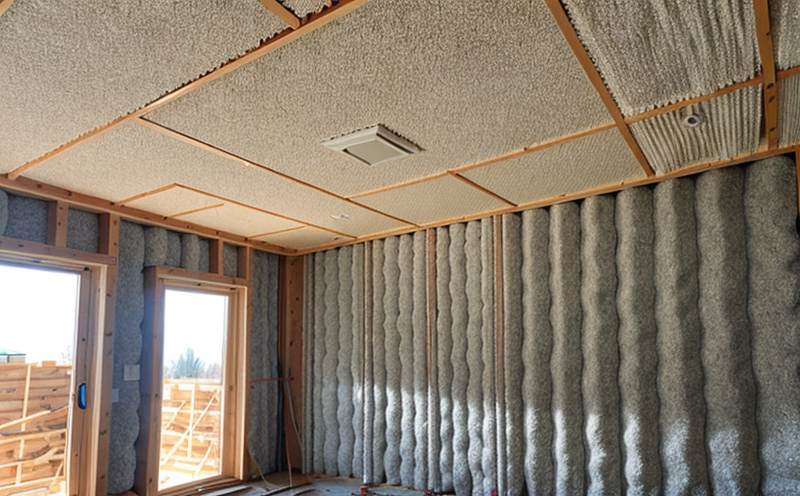Testing the flexural strength of materials used for insulation and soundproofing in construction
Testing the Flexural Strength of Materials Used for Insulation and Soundproofing in Construction Why It Matters
As the construction industry continues to evolve and prioritize sustainability, energy efficiency, and acoustic comfort, the need for high-quality materials has never been more crucial. One essential aspect of material selection is testing their flexural strength, particularly for insulation and soundproofing applications. At Eurolab, our laboratory services cater to this specific requirement, providing businesses with accurate and reliable data on the performance of various materials.
In this article, we will delve into the world of material testing, exploring why testing the flexural strength of materials used for insulation and soundproofing in construction is essential for companies. We will also highlight the advantages of using our laboratory services and provide a comprehensive QA section to address common queries.
What is Flexural Strength?
Flexural strength refers to a materials ability to withstand bending forces without failing or deforming excessively. In the context of insulation and soundproofing materials, flexural strength is critical in ensuring that these products can maintain their structural integrity under various environmental conditions.
Why Test Flexural Strength?
Testing the flexural strength of materials used for insulation and soundproofing in construction has numerous benefits for businesses
Ensures Performance and Safety By evaluating a materials flexural strength, you can guarantee its performance and safety in real-world applications. This is particularly important for products that will be exposed to various environmental factors, such as temperature fluctuations, humidity, and vibrations.
Reduces Risk of Material Failure Flexural strength testing helps identify potential weaknesses or vulnerabilities in materials, enabling companies to make informed decisions about their product development and implementation.
Meets Industry Standards and Regulations Many industries have established standards for material performance, including flexural strength. Testing your materials ensures compliance with these regulations and reduces the risk of costly rework or recalls.
Optimizes Product Development Accurate data on flexural strength enables companies to refine their products, making them more efficient, effective, and customer-centric.
Key Benefits of Eurolabs Flexural Strength Testing Services
Accurate Results Our state-of-the-art equipment and experienced technicians ensure precise measurements that meet industry standards.
Comprehensive Analysis We provide detailed reports on the flexural strength of your materials, including recommendations for improvement.
Expert Consultation Our team is available to discuss your testing needs, answer questions, and offer guidance on material selection and product development.
How Does Flexural Strength Testing Work?
Our laboratory services involve a series of steps
Material Preparation We receive samples from you, which are then prepared for testing according to standard protocols.
Testing Equipment Our equipment is specifically designed to simulate real-world bending forces on the material sample.
Data Analysis Our software and experienced technicians analyze the test data, providing accurate measurements of flexural strength.
QA Frequently Asked Questions About Flexural Strength Testing
Q What types of materials can be tested for flexural strength?
A We accept a wide range of materials, including foams, fibers, composites, and other insulation and soundproofing products.
Q How long does the testing process take?
A Our standard turnaround time is typically 3-5 business days, although this may vary depending on the complexity of the test and the number of samples received.
Q Are your laboratory services accredited or certified?
A Yes, our laboratory is ISO/IEC 170252017 accredited, ensuring that our testing procedures meet the highest international standards.
Conclusion
Testing the flexural strength of materials used for insulation and soundproofing in construction is a critical aspect of product development and material selection. At Eurolab, we offer comprehensive laboratory services that provide accurate data on the performance of various materials. By choosing our testing solutions, businesses can ensure compliance with industry standards, reduce the risk of material failure, and optimize their products for maximum efficiency and effectiveness.
Dont let uncertainty hold you back from creating top-quality construction products. Trust Eurolabs expertise in flexural strength testing to give your business a competitive edge.
-
Testing the ability of materials to withstand bending forces without breaking
-
Simulating the effects of bending and flexing on construction materials under load
-
Evaluating the resistance of materials to deformation and failure when subjected to flexural stress
-
Testing for the maximum bending load that materials like concrete, metal, and composites can withstand
-
Ensuring that structural elements, such as beams and slabs, maintain their integrity when subjected to bending forces
-
Simulating conditions in which materials will bend under load and testing for any cracks or fractures
-
Verifying the suitability of materials used for structural support in bending applications
-
Ensuring that materials used in walls, floors, and ceilings maintain their strength under bending stress
-
Testing how materials react when subjected to bending in different environmental conditions, such as heat or moisture
-
Simulating the bending behavior of materials used in high-stress applications like bridges and highways
-
Evaluating the performance of materials used for flooring and roofing under bending conditions
-
Verifying that the flexibility of materials like plastics and composites does not affect their overall strength
-
Simulating scenarios where bending forces are applied repeatedly to determine long-term durability
-
Testing how the shape and design of a material influence its resistance to bending or flexural forces
-
Ensuring that materials in construction retain their structural properties under bending stress over time
-
Verifying the strength and reliability of materials used in lightweight and modular construction
-
Testing for the ability of materials to return to their original shape after being bent (elasticity)
-
Evaluating materials for flexibility without compromising structural integrity or safety
-
Testing for bending failure, including cracking, warping, or twisting, under excessive load
-
Ensuring that building materials can resist bending deformation caused by shifting or settling foundations
-
Simulating real-world bending conditions, such as bending from wind or seismic forces, to test material resilience
-
Testing for the ability of materials to support heavy loads without losing their shape or structural performance




